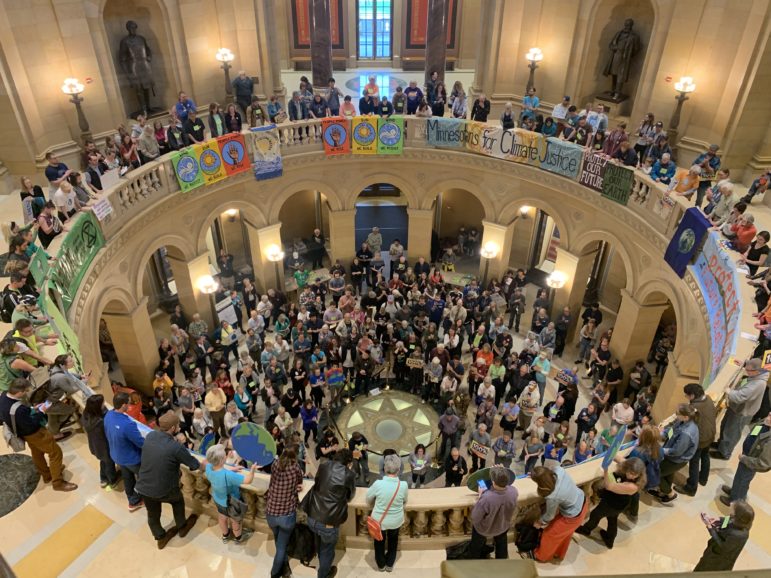
The 2019 session of the Minnesota legislature is in the books! While Fresh Energy and our allies at the 100% Campaign and beyond built a ton of momentum for clean energy this session, Minnesotans will have to wait at least another year for their elected leaders to find consensus around a truly forward-looking commitment to 100% clean electricity.
Governor Walz and the House of Representatives stepped up and pledged their support for clean and equitable energy in Minnesota in historic fashion this year, with the Governor committing to 100% clean electricity and the Minnesota House becoming the first legislative chamber in the Midwest to pass a 100% clean electricity commitment off the floor. The Governor’s proposal and House legislation also included critical policy components—Clean Energy First and Energy Optimization—that would have further solidified Minnesota’s clean energy path.
Meanwhile, thousands of Minnesotans took action in support of 100% clean electricity this year—attending rallies at the Capitol, contacting their legislators, and speaking up for a better future.
Unfortunately, the Senate chose not to budge: 100% clean electricity was never even given a hearing in the Minnesota Senate and a compromise was never reached. Many other clean energy provisions passed by the House of Representatives went unheard in the Senate. While we are disappointed in the final outcomes of the 2019 session, the momentum we’ve built will only continue to grow, and Fresh Energy remains committed to the goal of 100% clean electricity for all Minnesotans.
Despite the lack of a broader agreement on clean energy, several key pieces of legislation did pass with active support from Fresh Energy:
- Public schools energy benchmarking. After five hard years of Fresh Energy advocacy and work, the final Education Omnibus bill includes an important energy benchmarking provision. Minnesota’s B3 benchmarking system, which helps local school districts input and track their energy usage, is available free of charge to all public K-12 schools in the state. By comparing a school building’s energy use to itself and to peers, districts can identify opportunities for improvement in performance. Benchmarking schools puts more taxpayer dollars into the classroom, rather than wasting money on higher-than-necessary energy bills which contribute to climate change. Across the state, two-thirds of Minnesota schools benchmark—and they’ve already have identified over $10 million in cost savings. Thanks to bill authors Sen. Mike Goggin (R-Red Wing) and Rep. Shelly Christensen (D-Stillwater), and committee chairs Sen. Carla Nelson (R-Rochester), Rep. Jim Davnie (D-Minneapolis) and Rep. Cheryl Youakim (D-Hopkins).
- Reporting for solar farm vegetation. Senator Karin Housley successfully included a ground cover reporting requirement for solar farms in the Senate Jobs and Energy Omnibus bill. The requirement stipulates that solar developers complete a copy of Minnesota’s pollinator-friendly scorecard and file it with the Board of Water and Soil Resources once every three years to report on the pollinator-friendly land management practices in their solar projects. The new law is an important and incremental step to demonstrate productive use and stewardship of the land under and around solar farms. Thank you to Senator Housley and the Jobs and Energy Conferees from both chambers!
- Diversity in utilities stakeholder group. Fresh Energy advocated for greater reporting standards from utilities in Minnesota on their diversity and equity hiring practices. While the reporting standard did not pass, a stakeholder group, comprised of utilities and community partners, will now meet to explore hiring practices within the industry and identify what is necessary to better diversify the utilities’ workforce. Fresh Energy looks forward to being actively involved in this stakeholder group process. Credit to bill authors Sen. Patricia Torres Ray (D-Minneapolis) and Rep. Ruth Richardson (D-Mendota Heights) for their tireless advocacy in support of this critical step forward.
Fresh Energy’s government affairs team dedicated many long nights at the Capitol this legislative session to see through our clean energy priorities. The failure of the Minnesota Senate to meaningfully consider clean energy legislation is a major missed opportunity. Minnesota deserves better.
Although this session was not as fruitful as hoped, we are proud and grateful for the work of dedicated climate champions like Governor Walz, Speaker Melissa Hortman, Senator David Senjem and Representatives Jean Wagenius, Zack Stephenson and Jamie Long. We are looking forward to working alongside you and your colleagues to develop and advance sound, pragmatic solutions to meet the historic challenges and opportunities that await state policymakers in 2020 and beyond.
